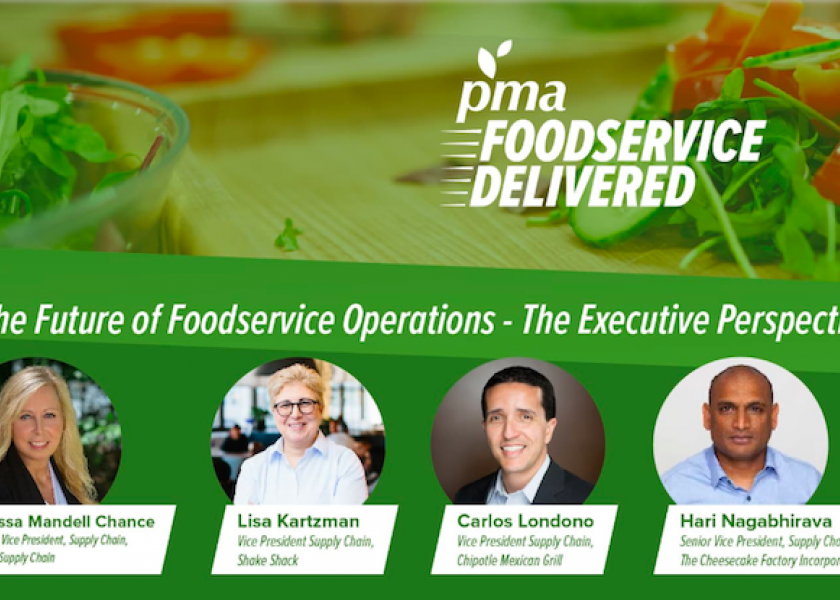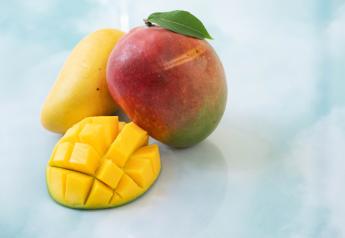What restaurant chain executives see for the future of foodservice

Deeper connections with supply partners, labor savings through technology and more racial diversity at top levels are takeaways that foodservice executives have gathered since the coronavirus disrupted the industry.
They discussed these topics in the opening general session, “The Future of Foodservice Organizations: The Executive Perspective,” at the Produce Marketing Association’s Foodservice: Delivered virtual conference on July 20.
“We have to remain optimistic. It’s going to take some time for our industry to come back again. But it will come back,” said panelist Lisa Kartzman, vice president of supply chain for Shake Shack. “Because the truth is, this country runs on foodservice. It does. And I think the baseline consumer now understands that.”
Supply chain kinks required the company to learn more about what was happening in the supply chain, with freight and sourcing from suppliers.
“We were able to get much more depth and transparency,” Kartzman said.
Chipotle Mexican Grill has also relied “more than ever” on its partners, such as Immokalee, Fla.-based Lipman Family Farms, Salinas, Calif.-based Taylor Farms, Santa Paula, Calif.-based Calavo Growers and Oxnard, Calif.-based Mission Produce, said Carlos Londono, vice president of supply chain.
“We’ve had to weather some storms together in a tough way. We actually shared some of the losses with our vendors,” Londono said.
Collaboration has reached a new level, said Anissa Mandell Chance, senior vice president of supply chain at Focus Brands, the parent company of Moe’s Southwest Grill, Auntie Anne’s, Carvel, Cinnabon, McAlister’s Deli and Schlotzsky’s.
“I don’t think any time in my career we’ve had to lean on those partnerships as much as we have during COVID,” Mandell Chance said.
Some companies have had to lay off employees, and it’s especially difficult to keep kitchen staff six feet apart, they said.
Investing in new technology has provided some solutions.
Chipotle Mexican Grill ramped up its new Chipotlane, which enables customers to order on an app or online and pick up their food without leaving the car, Londono said.
Shake Shack created standard operating procedures for handling the coronavirus, created curbside pickup, expanded its previously exclusive deal with GrubHub to all delivery services and scaled back its menu, Kartzman said.
Londono said he’s pushing for more spending in technology and traceability.
Hari Nagabhirava, senior vice president of supply chain of The Cheesecake Factory, said he wants to use more artificial intelligence and machine learning.
“The time is right. You should never let any crisis go to waste,” Nagabhirava said.
He sees a future consumer push for more regionalization and transparency.
Even though The Cheesecake Factory has increased its to-go service, the establishment is more of a dine-in experience, so Nagabhirava is waiting for consumer confidence to return as Disney and malls reopen, he said.
“It is in some markets; Cheesecake remains a place, as Drake would say, ‘for families who drive Camrys and go to Disney,’” Nagabhirava said with a smile, quoting the hip-hop artist’s lyrics about his restaurant.
Some executives said they are also doing internal reviews because nationwide racial-equality protests have coincided with the coronavirus.
“We are looking at our business from the outside in to see where we can improve, and there are lots of opportunities in that area,” said session moderator Kent Shoemaker, CEO of Lipman Family Farms.
Making room for equally qualified people of color and other marginalized communities at the top levels of companies is a challenge foodservice companies, growers and distributors need to tackle, Mandell Chance said.
“If you are in a leadership meeting, and you look around the room and everyone looks the same, then you are very unrepresented,” she said. “That’s something to be very aware of and make efforts, and not efforts that fall off the map in a month or two, but really concerted efforts within the organization.”
Kartzman said she was surprised after looking at the top positions at Shake Shack’s suppliers.
“It shouldn’t take something awful that just transpired in terms of the protests around Black Lives Matter to change companies,” Kartzman said. “It really should be a focus. This country that we live in and we enjoy is a melting pot, and the company should reflect it, frankly.”
Related news:
Lipman showcases green beans, other fresh cut at PMA Foodservice: Delivered







